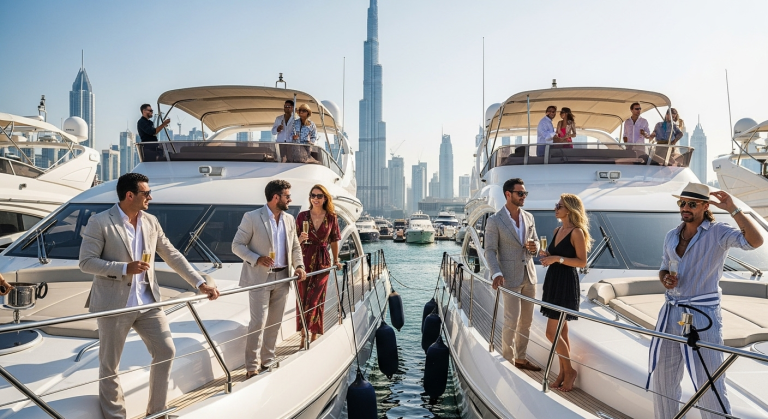Market Analysis and Opportunities
Luxury yacht charter services represent a premium niche in the UAE’s tourism and leisure sector, particularly in Dubai, which is recognized as a global luxury destination. According to Mordor Intelligence, the Middle East yacht charter market is expected to register a CAGR of over 6% from 2023 to 2028, with the UAE as a significant growth driver. Dubai’s vision to become a world-class maritime hub and the UAE government’s substantial investments in tourism infrastructure have cemented its appeal to high-net-worth individuals (HNWIs), corporate entities, and affluent tourists.
Target Market Analysis
- Market Size: The UAE yacht market is estimated at over USD 400 million, with Dubai accounting for a major share (Dubai’s Department of Tourism and Commerce Marketing).
- Growth Drivers: Factors such as increasing tourism arrivals (over 17 million international tourists in 2023), a rising HNWI population, and a thriving events calendar drive demand for luxury yacht experiences.
- Consumer Preferences: Charter customers seek personalization, privacy, exclusivity, and on-demand luxury experiences. Day charters, sunset cruises, and event-based rentals (weddings, corporate events) are particularly popular.
- Digital Transformation: Growing preference for online booking platforms, virtual yacht tours, and tailor-made itineraries is shaping the purchase journey.
- Sustainability: Eco-conscious practices and green yachting—like hybrid engines and sustainable catering—are attracting a new demographic of clients.
Marketing Needs
- Market Research: Ongoing analysis of competitor pricing, customer sentiment, and evolving preferences is key. Tools like customer surveys, social listening, and CRM analytics are invaluable.
- Digital Presence: Invest in SEO-optimized websites, Google Ads, and targeted social media campaigns on Instagram and TikTok, where visual content drives engagement. Leveraging yacht influencers and digital PR can elevate brand visibility.
- Brand Positioning: Position the business as the epitome of luxury, safety, and customization. Strategic alliances with hotels, concierge services, and event planners can open new distribution channels.
Expansion Potential
- B2B Segments: Partnering with corporates for team-building or product launches on yachts, as well as with travel agencies to package luxury experiences, opens new revenue streams.
- Geographic Expansion: Abu Dhabi, Ras Al Khaimah, and other GCC cities are untapped for yacht charter growth. Joint ventures can facilitate market entry.
- Diversification: Offer branded merchandise, premium catering, or ancillary water sports services to up-sell existing clients.
Comprehensive Business Overview
Industry and Business Model
Luxury yacht charter services operate within the UAE’s dynamic travel and hospitality sector. The business model is typically asset-light, operating via direct yacht ownership/lease or acting as a marketplace connecting yacht owners with clients. Revenue streams include hourly or daily charters, event hosting, and premium add-on services (catering, entertainment, excursions).
Target Audience
- Domestic and international HNWIs
- Corporate clients (retreats, incentives, executive meetings)
- Event planners (weddings, private parties, brand activations)
- Affluent tourists and expatriates seeking bespoke leisure
Operational Scope in the UAE
Operations predominantly focus on Dubai Marina, Palm Jumeirah, and Jumeirah Beach areas, leveraging proximity to luxury real estate, five-star hotels, and retail hubs. Offerings range from private short cruises to week-long charters covering UAE coasts and islands.
Mission, Vision, and Core Objectives
- Mission: Deliver extraordinary, customized yacht experiences that define Dubai luxury.
- Vision: To become the UAE’s leading and most innovative yacht charter provider, renowned for service excellence and sustainability.
- Objectives: Achieve operational profitability within two years, reach a 10% market share in Dubai, drive brand loyalty through distinctive experiences, and lead in green yachting initiatives.
Current Business Stage and Location
The sector witnesses both startup activity and mature operators. For market entry, Dubai Free Zone (e.g., Dubai Maritime City) or mainland setup (with DED license) offers advantages like 100% foreign ownership, easy licensing, and access to waterfront facilities.
Competitive Advantage
Unique Value Proposition and Key Strengths
- Bespoke experiences, unmatched hospitality, and seamless digital booking.
- Fleet of modern, eco-friendly yachts equipped with top-tier amenities.
- Exclusive partnerships with flagship marinas, hospitality entities, and event management firms.
Entrepreneur Perspective
- Viability: Strong market growth, recurring high-value clients, diverse revenue options (events, B2B).
- Strategic Entry: Leverage Dubai’s “fast-track” company setup, low taxation, and advanced marine infrastructure.
Investor Perspective
- Attractive Returns: Premium pricing and high demand yield superior ROI compared to standard leisure services.
- Growth Scalability: Scope to expand to GCC and global ports using Dubai as a launchpad.
- Data Example: Gulf Craft’s market report notes Dubai’s yacht segment outperformed global averages in 2023.
Manager Perspective
- Operational Leverage: Cloud-based booking, CRM, and crew scheduling minimize overheads and maximize uptime.
- Strategic Sourcing: Exclusive marina berths and premium asset management ensure superior fleet quality with optimal costs.
Financial and Investment Needs
Financial Requirements
- Setup: AED 800,000–1,200,000 for licensing, initial working capital, and marketing.
- Fleet Acquisition/Lease: AED 1,500,000–3,500,000 per yacht (for new or premium used models).
- Staffing: AED 40,000–60,000/month for core crew and admin staff.
- Marketing and R&D: AED 250,000–400,000/year for campaigns, digital platforms, and innovation initiatives.
Investment Potential
- High Demand: A projected annual charter market growth of 8-10% in Dubai enhances investor appeal.
- Investment Models: Early-stage equity, joint ventures, or profit-sharing structures recommended. Venture capital backing suits tech-enabled platforms for market disruption.
Financial Risks
- Cash Flow Volatility: Seasonality and upfront asset costs can stress operations.
- Currency Exposure: Global clientele may introduce FX risks.
- Mitigation: Offer membership/subscription models for steady revenue; secure insurance and diversify client base.
Human Resources and Recruitment
Workforce Needs
- Permanent crew (captains, deckhands, hospitality staff)
- Sales and marketing professionals
- Operations and customer service managers
- Specialists for digital marketing and IT support
A mid-sized charter business in Dubai typically requires 15–25 staff initially, scaling as fleet and demand grow.
Critical Skills and Expertise
- Marine certifications (for crew)
- Multilingualism for international clientele
- Digital marketing, customer service excellence
- Event management and F&B experience
HR Challenges and Strategies
- Recruitment: High competition for certified crew and hospitality specialists. Attractive compensation, benefits, and career development are essential.
- Retention: Implement performance incentives, training programs, and flexible scheduling.
Compliance with UAE Labor Laws
- Obtain proper work visas and contracts for staff.
- Comply with end-of-service benefit schemes.
- Adhere to occupational health and safety standards as set by the Ministry of Human Resources & Emiratisation.
- Proactively audit HR practices to ensure legal alignment.
Infrastructure and Operations
Infrastructure Needs
- Yacht Berths: Secure long-term marina leases in Dubai Marina or Palm Jumeirah.
- Office Space: Consider cost-effective Free Zone or co-working locations for non-maritime staff.
- Technology: Implement ERP, CRM, and yacht management solutions for booking, scheduling, and fleet maintenance.
Cost efficiency can be optimized by outsourcing non-core tasks (e.g., accounting, digital marketing).
Operational Optimization
- Weaknesses: Manual booking processes, dependency on travel agents, inefficient fleet scheduling.
- Solutions: Adopt automation (e.g., instant online booking), implement lean SOPs, and invest in analytics dashboards.
Legal Compliance
- Register business with Dubai Economic Department (DED) or relevant Free Zone.
- Obtain all necessary marine and tourism licenses (Dubai Maritime City Authority, Dubai Tourism).
- Open corporate bank accounts in local banks familiar with maritime industry needs.
- Engage professional consultancy for compliance—see business setup services for support.
Innovation and Technology
- Leverage AR/VR for virtual yacht tours and pre-sale engagement.
- Digitize client communication through chatbots and WhatsApp integrations.
- Pilot green yachting technologies (solar/hybrid propulsion, onboard water filtration).
- Continuous digital transformation keeps the business ahead of rising customer expectations.
Marketing and Branding Strategies
Brand Status
- Strengths: Luxury market positioning, visually striking digital assets, and exclusive event hosting credentials.
- Improvements: Clarify brand values (safety, sustainability) and grow local influencer partnerships to reach multicultural markets.
Marketing Channels
- Digital: SEO, PPC, remarketing ads, and targeted social media campaigns are essential. Feature user testimonials and influencer yacht experiences to enhance trust.
- Traditional: High-end travel magazines, presence at yacht/boat shows, and co-marketing with airlines and hotels.
- Leverage Sales and Advertising Services for broader reach and optimized ad spend.
360-Degree Campaigns
- Integrate digital ads, influencer takeovers, email nurture sequences, and exclusive on-board events for holistic marketing. For example, launch a “Dubai Yacht Experience Week” offering flash deals, luxury giveaways, and live social coverage to drive buzz.
- Host multi-national networking events that appeal to corporations and affluent communities.
Growth and Development Potential
Growth Strategies
- Pursue strategic partnerships with event companies, luxury lifestyle brands, and travel operators.
- Offer membership programs with exclusivity perks or bundled leisure services.
- Expand fleet capacity through charter management agreements with private yacht owners.
Networking
- Engage with Dubai Chamber of Commerce, Dubai Tourism, and maritime associations for business opportunities and regulatory updates.
- Utilize support from organizations like Persian Horizon for connections and business scaling.
International Potential
- Leverage Dubai’s strategic location, port infrastructure, and visa-free travel access for global clientele.
- Export the business model to emerging luxury hubs in the GCC, Mediterranean, or Indian Ocean, with Dubai as an operational headquarters.
Sustainability and Innovation
- Implement green charter initiatives: offer carbon offsets, digital documentation, and eco-responsible onboard services.
- Align with Dubai Vision 2030 for sustainable tourism and innovation by joining industry pilot programs.
Alignment with Dubai’s Market
Cultural Alignment
- Multilingual staff, inclusive service approaches, and cultural sensitivity in F&B/entertainment resonate with Dubai’s diverse population.
- Regular participation in major cultural, business, and sporting events (e.g., Dubai Boat Show, Expo events) boosts brand relevance.
Local Regulatory Compliance
- Ensure all commercial, tax, and employment documentation is aligned with UAE/Federal laws.
- Stay updated with VAT rules, import/export regulations for yachting equipment, and occupational safety mandates.
- Use professional consulting—for example, investment consulting services—to ensure compliance and best practices.
Advantages of Dubai
- Tax-free environment, advanced seaports, world-class marina facilities.
- Proximity to key international markets (Europe, Asia, Africa).
- Robust infrastructure, digital government services, and streamlined business setup.
- Strategic positioning as a “lifestyle capital” attracts affluent residents and brand partnerships.
Local Challenges and Solutions
- High Market Competition: Stand out through unrivaled service quality and innovative digital features.
- Setup Costs: Control capex with phased fleet acquisition and flexible marina agreements.
- Operational Risk: Leverage insurance and diversified services to buffer against seasonality or regulatory changes.
Conclusion
The luxury yacht charter sector in Dubai is primed for sustained growth, supported by strong demand from high-net-worth residents, corporate clients, and global tourists. With a focus on market-driven innovation, smart marketing, and operational excellence, entrepreneurs and investors can tap into lucrative returns. Challenges—such as intense competition and regulatory nuances—are offset by Dubai’s global positioning, business-friendly environment, and advanced infrastructure.
Actionable Recommendations for Stakeholders
- Entrepreneurs: Prioritize market research, leverage Free Zone advantages, and create differentiated, tech-enabled offers to maximize visibility and profitability.
- Investors: Consider capitalizing on early-stage ventures or portfolio diversification in yachting, with a focus on green and digital innovation.
- Managers: Invest in workforce training, process automation, and continuous brand building to sustain operational leadership.
For expert guidance on business setup, investment strategy, or scaling operations, explore Persian Horizon’s tailored services for the UAE and GCC markets. Stay updated with the latest industry insights on the Persian Horizon blog to ensure your luxury yacht charter business navigates toward sustainable success in Dubai’s dynamic marketplace.







